John Canaday’s newest book of poetry, Critical Assembly: Poems of the Manhattan Project, easily reads like a story about an era of American history that impacted the entire world. The Manhattan Project, code name for creation of atomic bombs during World War II, referred to the New York City borough where the project’s headquarters were located. The bombs, however, were assembled in New Mexico at the Los Alamos Laboratory and tested in a desert near Alamogordo, New Mexico, in 1945.
NewPages Blog
At the NewPages Blog readers and writers can catch up with their favorite literary and alternative magazines, independent and university presses, creative writing programs, and writing and literary events. Find new books, new issue announcements, contest winners, and so much more!
Critical Assembly
Spread the word!
And Then Snow
By some stroke of luck, I had Philip Sterling’s new book with me as I laid in bed, sick from the change in altitude after arriving in Bogota, Colombia. As I choked down saltines and felt sorry for myself, these self-effacing, wise, and often revelatory poems delivered me from myself for a few hours. Continue reading “And Then Snow”
Spread the word!
Record of Regret
Dong Xi, author of the novel Record of Regret, began submitting writing to Chinese magazines when he was fifteen, according to the novel’s translator Dylan Levi King. Since then, Dong Xi, the pen name of Tian Dailin, has written four novels and is a writer in residence at Guangxi University for Nationalities, China.
Spread the word!
Lit Mag Covers :: Picks of the Week
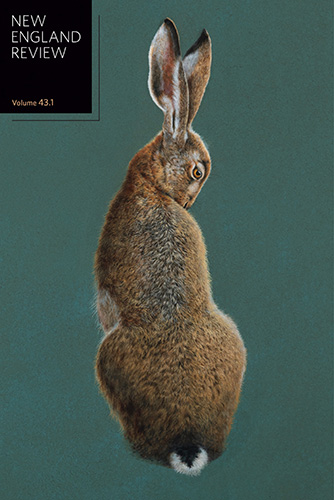
Monolith by Jeanne Borofsky on the cover of Volume 29 Number 1 2018 welcomes readers to the party celebrating New England Review‘s forty years of publication.
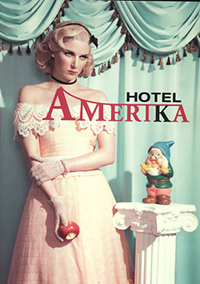
Kourtney Roy‘s pouting princess portrait entitled “Mythology” from autopotraits I is an intriguing cover choice for Hotel Amerika‘s Spring 2018 issue.
Croatian-born artist Moondrusannah’s artwork, featured in the online 8.1 issue of New Delta Review, is from her Illustrated Dreams Diary, of which she says, “Any clue to What Girls Really Dream About? I’m just starting to find that out myself, and I like what I see.”
Spread the word!
National Poetry Month 2018
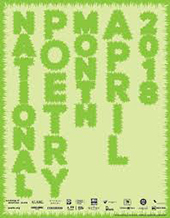 Join in National Poetry Month celebrations!
Join in National Poetry Month celebrations!
While supplies last, you can request a free copy of the 2018 National Poetry Month poster from the Academy of American Poets, designed by AIGA Medal and National Design Award-winning designer Paula Scher. The design celebrates typography and is suggestive of concrete poetry and Walt Whitman’s Leaves of Grass.
April 26 is Poem in Your Pocket Day. Carry a poem with you and share it with others! The Academy of American Poets provides a PDF Guide to Celebrating Poetry in Schools, Communities & Businesses, which includes a selection of pocket-sized poems (also cellphone, snapshot sized). Carry and share!
Teach This Poem features a poem each week from the Academy’s online collection accompanied by commentary and interdisciplinary resources and activities. Good for K-12 as well as early college.
Dear Poet Project invites grades five through twelve (Common Core lesson plan available) to write letters in response to poems written by poets connected with the Academy of American Poets. Deadline: April 30, 2018 for consideration for publication on Poets.org in 2018 as well as select letters receiving a response.
ReadWriteThink, the educational resource partnering with National Council of Teachers of English and International Literacy Association, provides classroom activities, websites, and related resources for teachers and parents of K-12 students.
The Poetry Foundation, publisher of Poetry, is all online all the time, providing poetry, poet biographies, news and educaitonal resources for all levels.
Reading Rockets, the national multimedia project from WETA Public Broadcasting, has a full page of resources: Poets on Poetry videos; Learning Through Poetry links to resources and organizations; Poetry Booklists; Video interviews with children’s poets; ideas for librarians; and a full list of activities.
American Life in Poetry features a weekly poem with brief commentary from Poet Laurate of the United States 2004-2006 Ted Kooser. Print and online news sources can sign up to reprint the columns.
NaPoWriMo, or National Poetry Writing Month, is an annual project in which participating poets attempt to write a poem a day for the month of April. Best to sign up early, but check it out this year to prepare yourself for next!
Spread the word!
New Lit on the Block :: Iron City Magazine
 If this data shared by Iron City Magazine doesn’t startle or sadden you, then you need to get woke: “The U.S., with less than 5% of the world’s population, has more than 20% of its prisoners, more people by raw number than any other nation in the world, regardless of size. Given that 1 in 135 Americans lives behind bars, U.S. prison complexes are like vast cities. If they were made into a state, it would be the 36th most populated.”
If this data shared by Iron City Magazine doesn’t startle or sadden you, then you need to get woke: “The U.S., with less than 5% of the world’s population, has more than 20% of its prisoners, more people by raw number than any other nation in the world, regardless of size. Given that 1 in 135 Americans lives behind bars, U.S. prison complexes are like vast cities. If they were made into a state, it would be the 36th most populated.”
Iron City Magazine: Creative Expressions By and For the Incarcerated is an annual online and print journal devoted entirely to writing and art from the prison world, and one that we should all be reading. The name, Iron City Magazine ’s Marketing Editor Jacqueline Aguilar tells me, comes from the image the word “prison” conjures in most of us: “Even though most prisons are chiefly nowadays made of concrete more than iron, it’s still the iron doors, iron bars, and razor wire that most resonate with our image of prison life.” Continue reading “New Lit on the Block :: Iron City Magazine”
Spread the word!
2018 Kalos Visual Art Prize Winners
Works by winners of the Ruminate 2018 Kalos Visual Art Prize can be viewed in the Spring 2018 issue, with a still from Eloisa Guanlao’s digital documentary Noli Me Tangere featured on the publication’s cover.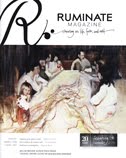
First Place
Eloisa Guanlao
Second Place
Janet McKenzie
Honorable Mention
Joseph Di Bella
Information about each of these selected artists and a full list of finalists can be found here.
Spread the word!
Creative Nonfiction Magazine Awarded AWP’s Small Press Award
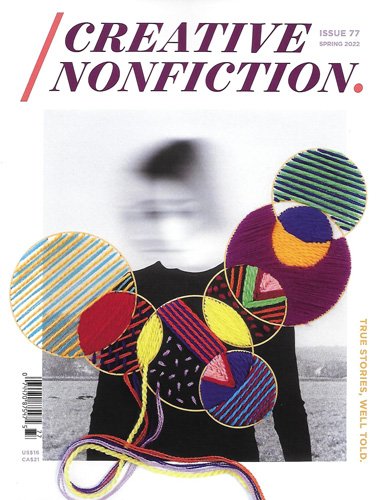 Pittsburgh-based literary magazine Creative Nonfiction is the winner of the 2018 Association of Writers and Writing Programs (AWP) Small Press Publisher Award. The prize was announced in Tampa, Florida, at an opening ceremony at AWP’s annual conference and bookfair, which brings together 11,000+ writers, teachers, and small-press publishers. The other finalists were Fence, the Normal School, and Terrain.org.
Pittsburgh-based literary magazine Creative Nonfiction is the winner of the 2018 Association of Writers and Writing Programs (AWP) Small Press Publisher Award. The prize was announced in Tampa, Florida, at an opening ceremony at AWP’s annual conference and bookfair, which brings together 11,000+ writers, teachers, and small-press publishers. The other finalists were Fence, the Normal School, and Terrain.org.
AWP’s Small Press Publisher Award is an annual prize for nonprofit presses and literary journals that recognizes the important role such organizations play in publishing creative works and introducing new authors to the reading public. The award acknowledges the hard work, creativity, and innovation of these presses and journals, and honors their contributions to the literary landscape through their publication of consistently excellent work. The award includes a $2,000 honorarium and a complimentary exhibit booth at the AWP Conference & Bookfair in the year following the recipient’s recognition. The prize is given to literary magazines in even years; Creative Nonfiction was a finalist in both 2014 and 2016.
Creative Nonfiction founder and editor Lee Gutkind said, “It’s really nice to be recognized in this way. Creative Nonfiction’s small staff is incredibly dedicated, and does so much with so little. And thanks go to our contributors—the writers and artists whose work makes the magazine possible. Twenty-four years ago, we brought the very first issue of Creative Nonfiction to this conference, and I was so nervous … but we sold every copy. So, thanks go to AWP, too, for all their support over the years.”
Creative Nonfiction is true stories, well told. Each issue of the quarterly features original essays and illustrations; writing that pushes traditional boundaries of the genre; notes on craft; micro-essays; conversations with writers and editors; and more. Almost every issue includes a writer’s first publication, and the editorial team emphasizes a thoughtful editorial process and rigorous fact-checking as vital elements of the organization’s overall educational mission. Visit creativenonfiction.org to learn more.
Spread the word!
Lit Mag Covers :: Picks of the Week
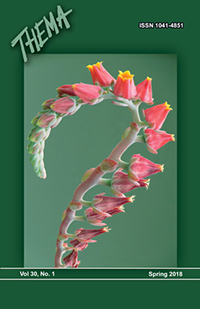
Thema‘s cover photo for their Spring 2018 issue is “Question the Answer” by Kathleen Gunton, appropriately fitting for the theme: “Is There a Word for That?” Perhaps not a word, but a beautiful image instead. Upcoming themes in search of submissions: “Where’s the food truck?” (July 1) and “The critter in the attic” (November 1).
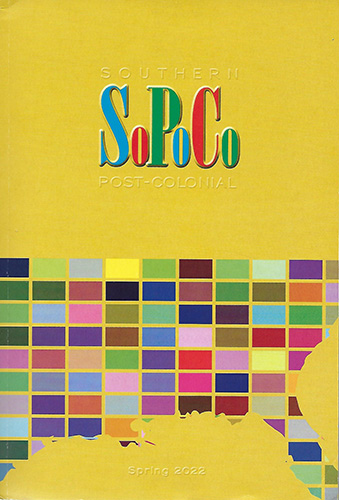
The cover and internal art portfolio of Georgia Review‘s Winter 2017 issue features a very different kind of garden life by sculptor Toshihiko Mitsuya: Aluminum. “Far from static,” Mitsuya says of his medium, “it takes on the feelings of its surroundings – the wind, the light an the hands that touch it.As a material, aluminum starts in a huge factory and ends in something precious yet transitive: the installation reclaims an industrial material back to nature.”

As unique as the vision through the cylindrical optic toy, Kaleidoscope is a publication “exploring the experiene of disability through literature and the arts.” Kristin Gehrmann’s “The Vial Keeper” reflects the Winter/Spring 2018 theme: Life’s Unpredicatbiilty. Now available open access online, readers unfamilar with this journal should defnitely check it out.
Spread the word!
R.T. Smith Prize for Narrative Poetry 2017 Winners
The most recent issue of Cold Mountain Review (v45 n2) features winners of the 2017 R.T. Smith Prize for Narrative Poetry:
 Winner
Winner
“We will Never Mend This” by Jeff Burt [pictured]
Read the beautifully heart-wrenching poem and hear it read by the author here.
Honorable Mention
“A Sestina for Traveling Season” by Geetha Iyer
“To Shadow” by Matthew Winberley
Finalist
“Prologue” by Jude Whelchel
Spread the word!
Lit Mag Covers :: Picks of the Week
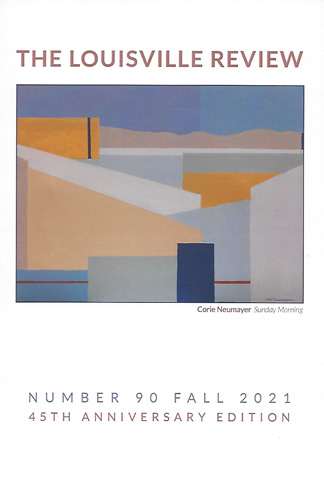
Gerald Plain’s photo “Spider Rock, Canyon DeChelly, Arizona” dizzying perspective draws readers into the newest issue of The Louisville Review (#82, Fall 2017). Inside, The Children’s Corner features high school sophomore Haemaru Chung’s poem “Waking Up.”
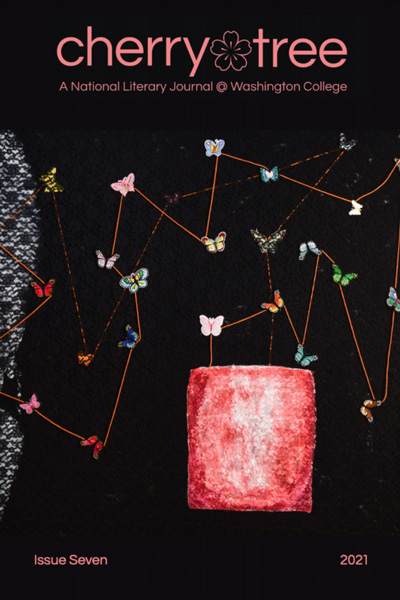
Looking forward to summer, I enjoy this cover image (also a bit dizzying) on issue four of Cherry Tree national literary journal published out of Washington College: “Children Running in Backlight (Dozza, Italy)” by Claudio Cricca.
The Art of Miss Fluff is featured in the Winter 2017-2018 issue of The Writing Disorder, and online quarterly of new and emerging writers and artists. Fluff is “an enchanting design brand created by artist, Claudette Barjoud.”
Spread the word!
Collateral Literary Journal – November 2017
I was fifteen-years-old when my brother enlisted in the Marine Corps and headed off to California for boot camp a few short weeks after his high school graduation. My cousin and then my aunt’s fiancé were the next to join, and before the three of them, it was my mother’s father and my great uncles. In a way, it has almost become a family affair to join the military, so reading online magazine Collateral Literary Journal felt like a welcoming and comforting experience—it is edited and filled with work by people who “get” the lifestyle. Each issue publishes voices from those touched by military service in poetry, prose, and art.
The fiction reads realistically, coming off almost as genuinely as nonfiction. “Homecoming” by E.M. Paulsen tackles the subject of PTSD when a soldier on leaves visits a laundromat and ends up frozen in fear when another patron’s child begins to choke on a cookie. Paulsen’s details put us in his shoes, stirring up the feelings of panic that can be triggered at any moment, even when you’re just innocently doing laundry.
After “The Ferry Back” by Morgan Crooks, Crooks reveals the fiction piece—featuring the complexities of a family relationship revolving around a military patch—”draws its conflict from personal experience: a war never truly ends, not within one lifetime or many.” Like Paulsen, Crooks writes with realism, the family interactions authentic.
With fiction so genuine and honest, one can expect the nonfiction to follow suit. Spoiler alert: it does. Kay Henry in “75 Years Later, What I Still Don’t Know” compares her life with her father’s seventy-five years earlier:
At 8:00 in the morning, I’m enjoying an ordinary breakfast outside on the front porch [ . . . ]. Except for a distant neighbor’s tractor, all is quiet.
Seventy-five years ago at this time of day, bombs began to fall on my father. Torpedoes began to hit his ship. [ . . . ] The U.S.S. Oklahoma, struck in the first minutes of the attack on Pearl Harbor, began to list. Young men began to die. My father was twenty-two.
She imagines him over and over, weaving between her life and his past: “Not to feel guilty or superior, nor to deepen my own sense of loss, but to see both days with more clarity. To know my young father. To bring him home.” By picturing this day and trying to put herself in his shoes, she is attempting to reach a greater understanding of the young man who experienced an incredible trauma, using writing to help achieve this.
Travis Burke utilizes a similar device in “Crawling Uphill,” the prose moving back and forth between present time in Portland and his past tour in Afghanistan. Burke repeatedly dreams of Massoud, an Afghan soldier friend who lost his life. Massoud and poppies haunt Burke, showing up again and again, in dreams and when awake. Massoud’s words stick with him: “An ant crawls uphill to go home.” And so Burke climbs a mountain as if climbing closer to home and the peace found there.
In “Dear Judith Wright” by Lisa Stice, the speaker wishes for peace for their daughter who keeps waking from nightmares, night after night. Stice gives her inspiration for the poem, explaining that she feels Judith Wright, who “wrote in support of the people with the least amount of power” would “empathize with the military children who are too young to really understand or express their feelings.” Stice’s speaker recycles Wright’s own words in an attempt to give some momentary peace and comfort: “it is only our past and future / troubling your sleep.” I remember my own nightmares from when I was a teen and my brother was overseas in Iraq. Much like the speaker’s child, I would wake up from dreams where I’d lose my brother in varying ways, unable to fully explain the fear and loss experienced in my dream world.
Tami Haaland’s “Noon Lockdown” is as timely as ever, especially after yesterday’s school walkouts protesting gun violence. A school is on lockdown, “men with guns / two floors down, swat teams, / nine police cars. We plan what to do.” Some students panic:
One is angry because
her mother failed to text love,
so I kiss her head as I would kiss
the heads of my own grown children.
The situation ends up being a misunderstanding. No one is in any real harm, and they’re all free to leave, the speaker visiting her own mother, “whose mind has turned / to lace.” The two sit together, the speaker not sharing the day’s events:
I hold her hand as if
there is nothing to say. [ . . . ]
I don’t
tell her a thing she will forget.
While the speaker offered comfort to her students when they needed it, she is left to quietly process on her own. Life goes on after the panic settles. Haaland has a new book coming out from Lost Horse Press next month: What Does Not Return. The distributor’s website says the collection “examines dementia and caregiving,” and if “Noon Lockdown” is any indication of the type of work one might find in the forthcoming book, it promises to be a thoughtful, skillfully written collection.
Art by Laura BenAmots accompanies the issue, pieces from “The Battle Portraits” collection staring out with emotive eyes. Readers can close out the issue with an interview with the artist along with full portraits from the series.
Collateral gives a personal, inside look into military and military-adjacent life. The journal offers community and comfort to those connected to military service, and for those living completely outside this lifestyle, Collateral still offers a welcoming, enlightening experience.
[www.collateraljournal.com]
Spread the word!
Swamp Ape Review – March 2018
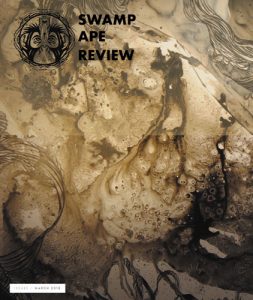
Founded last year at Florida Atlantic University, Swamp Ape Review has just dropped its second online issue. Issues are split into two sections, one featuring work by writers from South Florida, and the other featuring work from elsewhere. With the name Swamp Ape Review, one can’t help thinking of the weird and wild, and the editors don’t disappoint with their choices.
Continue reading “Swamp Ape Review – March 2018”Spread the word!
Glimmer Train – Winter 2018
Glimmer Train is one of those lit mags, making frequent appearances on “best of” lists and respected by readers and critics alike. Its stories have been selected numerous times for the Pushcart Prize and The Best American Series, as well as the O. Henry Prize. This issue continues providing evidence for these honors.
Spread the word!
A Public Space – 2017
Founded in 2006 by Brigid Hughes, A Public Space is considered one of the finest literary journals in the country; its stories frequently grace the pages of The Best American Series and The Pushcart Prize, and its editor has won the PEN/Nora Magid Award for Magazine Editing. The mission of the journal is to “seek out overlooked and unclassifiable work, and to publish writing from beyond established confines,” which it certainly meets in Issue Number 26. This current issue features a syllabus for an architecture studio, an art manifesto, the transcript of a deliberately unreadable speech by editor and writer Gordon Lish, letters to Saul Bellow, an essay on audience and performance, a proposal for a new means of displaying art in museums, notes on Main Streets across the country, and a travel journal, among the usual fiction and poetry contributions.
Spread the word!
Crab Fat Magazine – February 2018
I was more than excited to dive into the February 2018 edition of Crab Fat Magazine. This journal is available online for free, making it super accessible, and much to my elation upon entering the website, I was greeted by a welcoming little gif sticker that flashes between statements of inclusivity like “This journal is queer positive” and “This journal is asexual positive.” The journal actively seeks out the writing of marginalized folks.
Spread the word!
Ekphrasis – Fall/Winter 2017
I will be first to admit that I can’t remember the amount of times I’ve gone into an art museum, looked at a brilliant or famous painting and thought, “I have no idea what to pay attention to.” As much as I wanted to make a connection, my knowledge of the nuances in lighting and space are more than limited. As the name suggests, Ekphrasis features poetry exclusively about other works of art of any genre. These poems attach a personal narrative or wild description to the work in such a way that I was able to get my bearings when I looked at the original piece. During a reading of this journal, it was helpful to have a device with internet access available so I could look at the paintings and sculptures as I read the ekphrastic poem. This journal helped me to slow down and think about art a little differently.
Spread the word!
22nd National Poet Hunt Contest Winners
Along with commentary from final judge Naomi Shihab Nye, the Winter 2018 issue of The MacGuffin, published by Schoolcraft College in Michigan, features winners of the 22nd National Poet Hunt Contest.
 First Place
First Place
“The Last Time I head Her Play the Piano” by Bethany Reid [pictured]
Honorable Mention
“Big Sky Drive-in” by Kathleen McClung
“An Ordinary Afternoon” by Sue Fagalde Lick
Spread the word!
Lit Mag Covers :: Picks of the Week
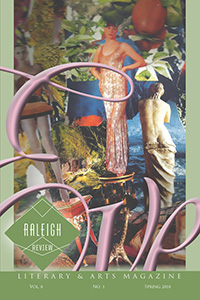 The Spring 2018 issue of Raleigh Review Literary and Arts Magazine features “Eve,” a lush collage by Geri Digiorno.
The Spring 2018 issue of Raleigh Review Literary and Arts Magazine features “Eve,” a lush collage by Geri Digiorno.

“Summer Rain” by Kristina Gehrmann on the Spring 2018 cover of Rattle poetry journal brightened my day, as did the special section inside the publication, “Tribute to Immigrant Poets,” which includes works by 18 poets who “no longer reside in their country of birth.”
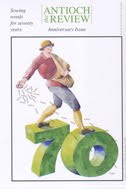
“Challenging Transitions” is the theme of most recent issue of The Antioch Review. Like the theme, David Battle’s cover image could be broadly interpreted but also directly reflective of Robert S. Fogarty’s Editorial, “The Brooklyn Bridge and Other Transitions.”
Spread the word!
New Lit on the Block :: The HitchLit Review
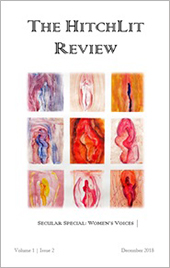 The HitchLit Review: A Secular Literary-Arts Journal publishes online twice per year, poetry, fiction, and non-fiction, and would consider short, stand-alone scenes from plays and screen plays as well as visual art and cover design. “There are many literary magazines,” The HitchLit Review Founder and Editor Daniel Ruefman tells me, “but in a growing community of secular voices, few publications are focused on giveing them a platform. In addition to that, there are a lot of misunderstandings about what it means to be secular today (atheist, agnostic, freethinker, skeptic, etc.). By highlighting secular voices through literature and art, HitchLit hopes to confront stereotypes and demonstrate just how diverse the secular community is.”
The HitchLit Review: A Secular Literary-Arts Journal publishes online twice per year, poetry, fiction, and non-fiction, and would consider short, stand-alone scenes from plays and screen plays as well as visual art and cover design. “There are many literary magazines,” The HitchLit Review Founder and Editor Daniel Ruefman tells me, “but in a growing community of secular voices, few publications are focused on giveing them a platform. In addition to that, there are a lot of misunderstandings about what it means to be secular today (atheist, agnostic, freethinker, skeptic, etc.). By highlighting secular voices through literature and art, HitchLit hopes to confront stereotypes and demonstrate just how diverse the secular community is.”
Continue reading “New Lit on the Block :: The HitchLit Review”
Spread the word!
Michael Dowdy MSR Poetry Book Award Winner
 The Winter 2017-2018 issue of The Main Street Rag features an interview with Michael Dowdy, author of URBILLY, winner of the 2017 Main Street Rag Poetry Book Award. In it, Dowdy talks about his lifelong love of books and choice of the “academic route” over his “recessive hillbilly” DNA strain, his shifting majors in college, taking a stab at the family business, how the poetry for URBILLY came about, and his interests from Appalachian Latino literature to “undocumentary” poetry.
The Winter 2017-2018 issue of The Main Street Rag features an interview with Michael Dowdy, author of URBILLY, winner of the 2017 Main Street Rag Poetry Book Award. In it, Dowdy talks about his lifelong love of books and choice of the “academic route” over his “recessive hillbilly” DNA strain, his shifting majors in college, taking a stab at the family business, how the poetry for URBILLY came about, and his interests from Appalachian Latino literature to “undocumentary” poetry.
Spread the word!
New Orleans Review Online Only
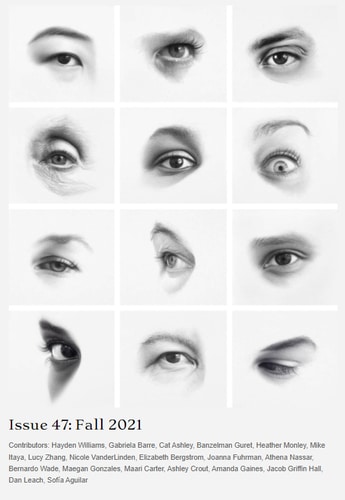 The Editor’s Note in New Orleans Review Issue 43 (Themed: “This Hustle Is Not Your Grandpa’s African Lit”) contained the following announcement:
The Editor’s Note in New Orleans Review Issue 43 (Themed: “This Hustle Is Not Your Grandpa’s African Lit”) contained the following announcement:
“Since its founding in 1968, New Orleans Review has had the pleasure of including in its pages the work of hundreds of writers, poets, essayists, critics, celebrities, and artists from around the world. We take particular delight in having published numerous ‘first-time-in-print’ authors as well as offering eclectic volumes on a range of topics and forms – from Alexander Pope’s ‘The Rape of the Lock’ to Post-Structuralism, from Spanish-language film to Czech writing in translation, and from Science Fiction to a set of seven chapbooks enclosed in a slipcase. As the journal enters its 50th year, this special issue on contemporary writing from Africa celebrates our final printed volume. Both honoring its past and embracing its future, New Orleans Review will continue to publish new work in an expanded digital venue, which will also include free access to all 50 years of print issues.”
Spread the word!
Glimmer Train 2017 Family Matters Contest Winners
Glimmer Train has just chosen the winning stories for their Family Matters competition. This competition is held once a year and is open to all writers for stories about family of all configurations. Glimmer Train’s monthly submission calendar may be viewed here.
1st place goes to  Peter Nathaniel Malae [pictured] of McMinnville, Oregon, who wins $2500 for “El Camino.” His story will be published in Issue 103 of Glimmer Train Stories.
Peter Nathaniel Malae [pictured] of McMinnville, Oregon, who wins $2500 for “El Camino.” His story will be published in Issue 103 of Glimmer Train Stories.
2nd place goes to Gregory J. Wolos of Millis, Massachusetts, who wins $500 for “Boy Strangling Goose.” His story will also be published in an upcoming issue of Glimmer Train Stories, increasing his prize to $700.
3rd place goes to Chloe Higgins of Wollongong, Australia, who wins $300 for “Things We Cannot Say.”
Here’s a PDF of the Top 25.
Spread the word!
New Lit on the Block :: Twyckenham Notes
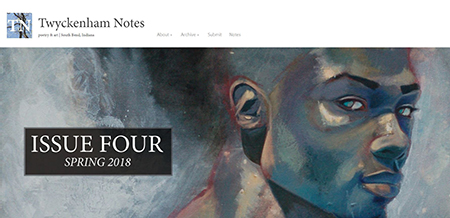 Twyckenham is a name linked strongly with South Bend and Twyckenham Notes Editor in Chief Austin Veldman, who grew up there at a time when the economic slump felt by many post-automobile industry cities lingered on. “In the early 2000’s,” Veldman says, “the prevalent attitude of the town’s youth was not lost on me: I wanted to leave as soon as I could. The common words among most were there is nothing to do here.” And yet, not even a decade later, Veldman founded Twyckenham Notes in response to what he saw happening in his city, “a reemergence, the founding of a new identity,” contributing literature to help in this rebirth and renewal.
Twyckenham is a name linked strongly with South Bend and Twyckenham Notes Editor in Chief Austin Veldman, who grew up there at a time when the economic slump felt by many post-automobile industry cities lingered on. “In the early 2000’s,” Veldman says, “the prevalent attitude of the town’s youth was not lost on me: I wanted to leave as soon as I could. The common words among most were there is nothing to do here.” And yet, not even a decade later, Veldman founded Twyckenham Notes in response to what he saw happening in his city, “a reemergence, the founding of a new identity,” contributing literature to help in this rebirth and renewal.
Spread the word!
These Are Our Demands
The twelve stories in These Are Our Demands dip their toes into potential futures and alternate realities. The characters in Matthew Pitt’s stories are vivid and sassy, and the writing is otherworldly. This collection lures you in with the promise of comfort, and then pulls down the straps and sends you on an unexpected wild ride. The stories have an unrivaled originality that is bound to keep you reading till the las page.
Spread the word!
The Church in the Plains
Rachel Rinehart’s new collection The Church in the Plains is a historical, cultural, and religious journey, as Rinehart explores her German Lutheran roots in a richly reflective and imaginative book of poetry. With a knack for rendering human peculiarities and foibles, Rinehart writes poetry with echoes of Robert Lowell and the confessional poets, but with a streak of heritage and flair all her own.
Spread the word!
Bright Raft in the Afterweather
Jennifer Elise Foerster’s brand-new poetry collection Bright Raft in the Afterweather is an elegant, lyrical journey across lands near and far and times past, present, and future. A very gifted poet with an NEA Creative Writing Scholarship, a Lannan Foundation Writing Residency Scholarship, and a Wallace Stegner Fellowship, Foerster, a member of the Muscogee Nation of Oklahoma, writes poems that are teeming with connection to the natural world, yet also aware of the dangers of human greed.
Spread the word!
Some Beheadings
A thing is a cicada when it tends toward sexual disorientation
& I is an orient in the sense that all things wend toward me.
Aditi Machado’s debut collection, Some Beheadings, is a delicate meditation on the origin of thought. Somewhere between Wittgenstein and Rilke, with splatterings of Gertrude Stein, each page is a flower opening to reflect spring. “A wind blows, the desert unfolds.” “The desert melts, the sky’s glass.” Some Beheadings reads like bits of a shattered rainbow.
Spread the word!
Tina Goes to Heaven
If I told you the quick plot summary of Tina Goes to Heaven, by Lois Ann Abraham, you might visualize a familiar movie reel of hooker-with-a-heart-of-gold stories, and then you might yawn and ask me what else I was reading. But you’d have it wrong, and I’d have done you a grave disservice. Continue reading “Tina Goes to Heaven”
Spread the word!
Like a Champion
Have you ever taken homemade food to a picnic just to have it ignored? Then you might recognize yourself in Vincent Chu’s story called “Ambrosia,” which appears in his first book of short fictions, Like a Champion. In it, our narrator’s girlfriend brings the sweet dessert to a barbecue with this result: “In the middle of the table sits the uneaten ambrosia, cubes of strange fruit drowning slow deaths in white glob, wincing under the summer sun.” But in this case, a simple sentence will turn the embarrassing situation around with unexpected results.
Spread the word!
Mud Song
Terry Ann Thaxton approaches her third book of poetry, Mud Song, with a native Floridian’s familiarity. We know about Florida oranges, alligators, and hurricanes, and she doesn’t ignore these attributes, but there’s a lot more of Florida in her book that won the 2017 T. S. Eliot Prize for Poetry.
Spread the word!
Peluda
Okay, ready? Would you rather be completely covered in fur, like, head-to-toe, monster type of shit or, stay with me, stay with me, be completely smoothie-smooth in all of the right places: thighs, crotch, armpit, upper lip, neck?
— from “We Play Would You Rather at the Galentine’s Day Party”
Spread the word!
Books :: 2017 Autumn House Press Contest Winners
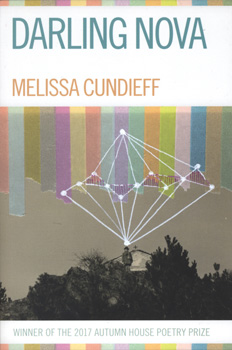 Autumn House Press annually hosts contests for full-length manuscripts of fiction, nonfiction, and poetry. Each winner receives publication, and $2,500 ($1,000 advance against royalties and $1,500 for travel and publicity). The 2017 winners will be available for purchase next month.
Autumn House Press annually hosts contests for full-length manuscripts of fiction, nonfiction, and poetry. Each winner receives publication, and $2,500 ($1,000 advance against royalties and $1,500 for travel and publicity). The 2017 winners will be available for purchase next month.
In fiction, Glori Simmons’s Carry You, selected by Amina Gauthier, is an intense read, a linked collection of intertwined stories. Advance praise calls the collection gorgeous, moving, and deeply empathetic.
Dickson Lam’s memoir Paper Sons was selected by Alison Hawthorne Deming. Paper Sons combines memoir and cultural history, violence marking the story at every turn. Deming calls the book important and “beautifully crafted, rich in poetic image and juxtapositions.”
Alberto Ríos selected Darling Nova by Melissa Cundieff as the poetry 2017 poetry winner. The collection makes “new connections, new sparks, new thoughts as often as line to line,” and covers “grief, love, humanness,” moving readers.
While you’re learning more about the 2017 prize winners, be sure to stop by the contest submission guidelines: entries are now open until the end of June.
Spread the word!
Books :: 2017 Lena-Miles Wever Todd Prize Winner Published
 Available this month is the winner of the 2017 Lena-Miles Wever Todd Prize for Poetry: Bridled by Amy Meng. Selected by Jaswinder Bolina, Bolina says of his selection:
Available this month is the winner of the 2017 Lena-Miles Wever Todd Prize for Poetry: Bridled by Amy Meng. Selected by Jaswinder Bolina, Bolina says of his selection:
Bridled is poetry as slow-burn opera. [ . . . ] The poems here offer, in reverse chronology, the story of a crumbling relationship between an unnamed speaker and her nameless ‘lover.’ In this telling, Bridled articulates a politics of self versus other, of body and gender, of loneliness and togetherness. It’s a collection you’re going to want to read from start to finish and then from finish to start.
A Kundiman Fellow and poetry editor at Bodega Magazine, this is Amy Meng’s first collection. Stop by the Pleaides Press website to learn more.
Spread the word!
Glimmer Train Nov/Dec 2017 Very Short Fiction Winners
Glimmer Train has just chosen the winning stories for their 2017 November/December Very Short Fiction Award. This competition is held three times a year and is open to all writers for stories with a word count under 3000. The next Very Short Fiction competition will take place in March 2018. Glimmer Train’s monthly submission calendar may be viewed here.
 1st place goes to Corey Flintoff [pictured] of Cheverly, Maryland, who wins $2000 for “Early Stages.” His story will be published in Issue 103 of Glimmer Train Stories. This will be his first major print publication.
1st place goes to Corey Flintoff [pictured] of Cheverly, Maryland, who wins $2000 for “Early Stages.” His story will be published in Issue 103 of Glimmer Train Stories. This will be his first major print publication.
2nd place goes to Irene Doukas Behrman of Portland, Oregon, who wins $500 for “Permission.”
3rd place goes to Itoro Udofia of Oakland, California, who wins $300 for “To the Children Growing Up in the Aftermath of Their Parents’ War.”
Here’s a PDF of the Top 25.
Deadline soon approaching! Short Story Award for New Writers: February 28
This competition is held three times a year and is open to all writers whose fiction has not appeared in a print publication with a circulation over 5000. No theme restrictions. Most submissions to this category run 1000-4000 words, but can go up to 12,000. First place prize wins $2500 and publication in Glimmer Train Stories. Second/third: $500/$300 and consideration for publication. Click here for complete guidelines.
Spread the word!
Lit Mag Covers :: Picks of the Week
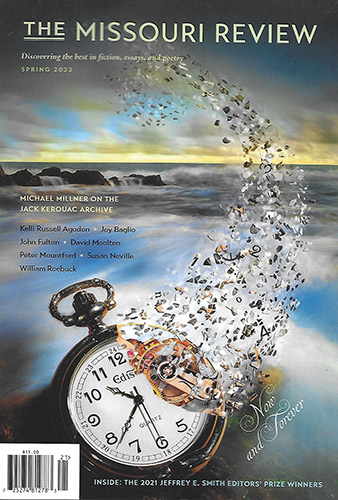
The Missouri Review v40 n4, 2017 features intriguing cover art by Su Blackwell entitled “Heroines of Literature,” a finely crafted paper sculpture. More of Blackwell’s work can be viewed on her website.

According to Editor and Founder Robert Stapleton, Booth 11 is a “stunning collection of contemporary femal writers. The issue includes new fiction, nonfiction, poetry comics, lists, and interviews by such esteemed authors as Emily St. John Mandel, Joyce Carol Oates, Marya Hornbacher, Elizabeth Strout, Krista Christensen, Aubrey Hirsch, Brenda Shaughnessy, and so many more. This full-color literary journal offers a powerful argument for the strength of female authors working in American letters.” Beginning it all: cover art by Tara McPherson.
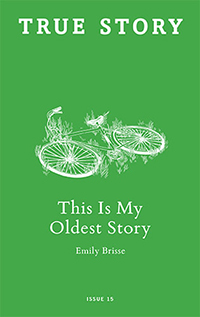 The cover image by Lucy Engelman made me open Issue 15 of Creative Nonfiction’s monthly publication, True Story, the opening paragraph of “This Is My Oldest Story” by Emily Brisse made me drop everything and just read. It begins: “In May of 1992, a little before the end of fourth grade, my best friend Kristy and I and a few others from our street – Ryan, Tim, Tom, maybe Naomi – hopped on our bikes and started riding. Most of us had younger brothers, and we left them at home. We didn’t tell our parents we were going. They thought we were in the basement of Tim’s house, playing Tetris, and although their anxiousness had relaxed by inches over the past two and a half years, we knew that any request to bike farther than the outlined boundary of our street would receive a firm no. So we just went.”
The cover image by Lucy Engelman made me open Issue 15 of Creative Nonfiction’s monthly publication, True Story, the opening paragraph of “This Is My Oldest Story” by Emily Brisse made me drop everything and just read. It begins: “In May of 1992, a little before the end of fourth grade, my best friend Kristy and I and a few others from our street – Ryan, Tim, Tom, maybe Naomi – hopped on our bikes and started riding. Most of us had younger brothers, and we left them at home. We didn’t tell our parents we were going. They thought we were in the basement of Tim’s house, playing Tetris, and although their anxiousness had relaxed by inches over the past two and a half years, we knew that any request to bike farther than the outlined boundary of our street would receive a firm no. So we just went.”
Spread the word!
New Lit on the Block :: MORIA Literary Magazine
 Olives are a succulent fruit, each containing a seed with which to grow more nourishing deliciousness. What better inspiration, then, for MORIA, the new literary publication from Woodbury University, where an olive grove once stood on the land that now houses this Californian educational institution.
Olives are a succulent fruit, each containing a seed with which to grow more nourishing deliciousness. What better inspiration, then, for MORIA, the new literary publication from Woodbury University, where an olive grove once stood on the land that now houses this Californian educational institution.
Faculty Editor of MORIA Literary Magazine, Dr. Linda L. Dove, tells me MORIA refers to a special type of olive tree in ancient Greece that is protected by the government. “As a tree sacred to Athena, the goddess of wisdom, the original ‘Moria’ was believed to have been planted by her at the Parthenon and includes the meaning ‘to be part of’ something larger than itself. Here at the literary magazine, we recognize and celebrate that Woodbury University is a part of a tradition of learning that is larger than itself, just as literature and the writers who make it are part of a tradition of creative engagement and cultural production that is larger than any one individual alone.” Beautiful.
Continue reading “New Lit on the Block :: MORIA Literary Magazine”
Spread the word!
Malahat Review 2017 Prize Winners
The Malahat Review issue #201 (Winter 2017) includes two prize winning works:
 Far Horizons Award for Short Fiction
Far Horizons Award for Short Fiction
Selected by Steven Price
“Faster Horses” by Katherin Edwards
Constance Rooke CNF Prize
Selected by Brian Brett
“Flaubert’s Hummingbirds” by Nancy Holmes [pictured]
Read more about The Malahat Review prizes as well as interviews with each of the winners here.
Spread the word!
Question Everything Advises Danielle Lazarin
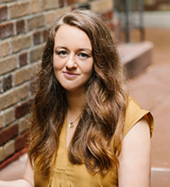 In her craft essay in the February 2018 #133 issue of Glimmer Train’s Bulletin, Danielle Lazarin tells readers to “Question Everything” as she does in her own drafting process. Her essay opens:
In her craft essay in the February 2018 #133 issue of Glimmer Train’s Bulletin, Danielle Lazarin tells readers to “Question Everything” as she does in her own drafting process. Her essay opens:
“On some days, my writing notebooks look like an inquisition, my pages topped and ended with questions: in all-caps, underlined, circled. Many are small: What do the kids want to be called? What is her work? Handwriting=obsessive or careless? Maybe she cries on the subway home, after dinner? But they’re big, too: What is true, the memory of it, or the moment? Is she lacking? DO WE REQUIRE HOPE? Though they may appear frantic, a series of scribbled questions aren’t signs of confusion or desperation but of sufficient curiosity on my part to propel a story forward. At every stage of my work, questions are my most essential writing tools. I use them to move through to the other side of murky. It’s only by stepping into that unknown and uncomfortable space repeatedly during my process that I can become more deliberate in the story I’m telling.”
Also included in this month’s GT Bulletin are Thomas Fox Averill’s “Writing Archival Fiction” and Aline Ohanesian “On Rejection.” The Bulletin is free to read online and have delivered monthly to your e-mail.
Spread the word!
Lit Mag Covers :: Picks of the Week
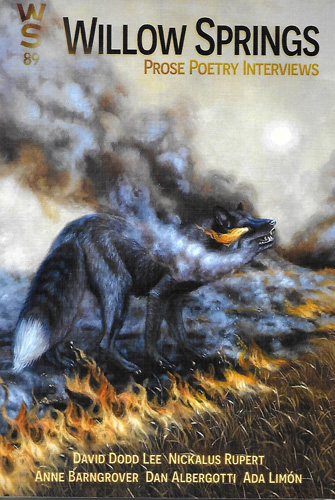
Willow Springs Issue 81 features this brightly colored image, originally a 13 x 13 silkscreen. The “inside cover” replicates this image, but with “Spokane Garbage Goat” replacing the issue number. I had no idea what this was, so promptly headed to Google, where I learned of the iconic status of said goat. Absolutely delightful, as is artist Chris Bovey’s work, more of which can be found at Vintage Prints.
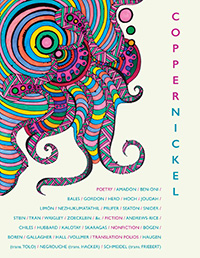
Rebecca Berlin’s marker on paper “Circles That You Find” brightens the cover of the Spring 2018 (#26) issue of Copper Nickel. See more of her work at Rebecca Berlin Art.

Keeping with vibrant colors, The Fiddlehead Winter 2018 (# 274) issue features Monika Wright’s “With Powerful Intention” acrylic on canvas. In her artist’s statement, Wright comments, “With organic shapes, fluid light, lines and circles, I am employing universal symbols of unity, wholeness and infinity connected by lines, representing the boundaries which separate us, but which also highlights our shared path.” See more of her work here.
Spread the word!
Prime Number Magazine – January/February 2018
The phrase “prime number” is one that generally gives me the chills, reminding me of past days of math classes and the frustration tied to them. However, Prime Number Magazine manages to have the opposite effect: it’s a fun and quirky online journal with a lot to offer readers.
Continue reading “Prime Number Magazine – January/February 2018”
Spread the word!
Geist – Fall 2017
I was pleasantly intrigued looking through this Fall 2017 issue of the Canadian literary magazine, Geist. Between the unique artwork and photographs, I found interesting poems, anecdotes of encounters with native peoples, and unique short stories, culminating in a cryptic crossword puzzle that I am compulsively returning to.
Spread the word!
The Healing Muse – Fall 2017
As a journal published by the Center for Bioethics and Humanities, The Healing Muse has a commitment to encouraging healthcare that is personal and compassionate. In a time when our access to healthcare in America is being regularly threatened, the work done by this journal is essential as ever. Featuring work that centers exclusively on the body and illness, The Healing Muse is a shining example of the power of medical humanities.
Continue reading “The Healing Muse – Fall 2017”Spread the word!
Hiram Poetry Review – Spring 2017
The cover of Hiram Poetry Review’s 78th issue features a photo of two young men who look like they are turn of the century bohemians, one holding a mandolin in his hands, the other with an open book, neither looking into the camera or at each other. They look kind of baffled by their own existence, like they’re thinking about the passage of time. Maybe I’m projecting a little, but regardless, I felt it captured the themes of this edition nicely. The pieces in this edition seemed particularly interested in growing older and how we change or fail to change.
Spread the word!
Eleven Eleven – 2017
Issue 23 is notable for a number of reasons, including the departure of longtime Faculty Editor Hugh Behm-Steinberg—and what an exit it is. The current issue of Eleven Eleven (8” x 8” if you’re curious) is large, daring, fun, and occasionally a hot mess. Consistency is hard to achieve with student-run publications; editors are cycling out each year as new staff comes whirling in, and errors occasionally slip through the cracks. In most cases, the missed edits are those spellcheck would ignore—e.g. a “bowl” movement or a phrase in Latin “hat” translates—but others, like “Dega’s painting” (it should be Degas’ or Degas’s), remain unchanged too, unfortunate blemishes on otherwise pristine pages. Viewed separately, these missed edits are minor blips, but piled together (and there are plenty more), the issue is cheapened, and even the best pieces, impeccably written and edited as they may be, are done a disservice.
Spread the word!
2017 Able Muse Write Prize Winners
Winners and finalists for the 2017 Able Muse Write Prize for Poetry and Fiction are featured in the Winter 2017 issue of Able Muse: A Review of Poetry, Prose & Art.
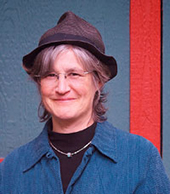 Write Prize for Fiction
Write Prize for Fiction
Final Judge: Jill Alexander Essbaum
Winner: “Target” by Leslie Jill Patterson
Write Prize for Poetry
Final Judge: Annie Finch
Winner: “Fall Rewinding” by D. R. Goodman [pictured]
Finalists: Ann M. Thompson; Scott Ruescher; Rob Wright
For a full list of honorable mentions and short list selections, visit the Able Muse 2017 Write Prize announcement page.
Spread the word!
The Florida Review Prison Focus

The Florida Review Editor and Director Lisa Roney in the 41.2/2017 issue Editor’s Note writes in a recurring thread about the U.S. prison culture, her early experiences knowing young people who went in and out of jail, and – of all things – changing the publication’s submission policy to accept traditional postal submissions from those without Internet access, “whatever the circumstances might be.” This, of course, would open submissions to our nation’s incarcerated population who are not allowed access to the Internet.
About the Special Section on Prison, Roney writes, “we include writing by prisoners, as well as their family members and friends. It is the presence of this Triumvirate (victims, prisoners, family and loved ones) that testifies to the widespread tragedy that violence, addiction, and poverty and their results have become in this country – and our constant sense that there must be some better way. Writing, of course, is one of those better ways.”
Spread the word!
2017 Gulf Coast Prize Winners
The Winter/Spring 2018 issue of Gulf Coast features the winners of their 2017 Gulf Coast Prizes contest:
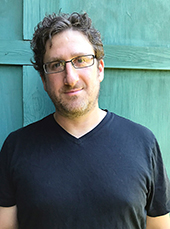 Poetry
Poetry
Judged by Cate Marvin
“The Weather Underground” by sam sax
Nonfiction
Judged by Diane Roberts
“The Peacock and the Bell Captain” by Spencer Wise
Fiction
Judged by Chinelo Okparanta
“That Boy Could Run” by Rudy Ruiz [pictured]
For a full list of honorable mentions and biographical information on each writer and judge, visit the Gulf Coast Prize page.
Spread the word!
ALA Intellectual Freedom Blog
 Intellectual Freedom Blog hosted by the Office for Intellectual Freedom, a unit of the American Library Association, provides “a venue for coverage of time-sensitive news in intellectual freedom and librarianship.” The topics, however, are of interest to a much wider audience, including writers, readers, and academics – teachers, students, and administrators. Recent post titles include: “Is There a Connection Between Mental Health and Intellectual Freedom?” by Allyson Mower; “‘The Post,’ the Pentagon Papers, and the Era of Fake News” by Robert Sarwark; “Xicanas/Latinas and Intellectual Freedom in College: When Reading is Political” by Eva Rios-Alvarado; “Reading as a Mirror: Banning the New Jim Crow in New Jersey Prisons” by Jane’a Johnson [pictured]; and weekly roundups of Intellectual Freedom News.
Intellectual Freedom Blog hosted by the Office for Intellectual Freedom, a unit of the American Library Association, provides “a venue for coverage of time-sensitive news in intellectual freedom and librarianship.” The topics, however, are of interest to a much wider audience, including writers, readers, and academics – teachers, students, and administrators. Recent post titles include: “Is There a Connection Between Mental Health and Intellectual Freedom?” by Allyson Mower; “‘The Post,’ the Pentagon Papers, and the Era of Fake News” by Robert Sarwark; “Xicanas/Latinas and Intellectual Freedom in College: When Reading is Political” by Eva Rios-Alvarado; “Reading as a Mirror: Banning the New Jim Crow in New Jersey Prisons” by Jane’a Johnson [pictured]; and weekly roundups of Intellectual Freedom News.
Spread the word!
The Massachusetts Review: More than a Lit Mag
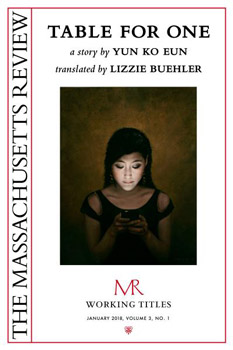 Readers may already be familiar with The Massachusetts Review, the quarterly print journal founded in 1959, but did you know they also have digital projects available?
Readers may already be familiar with The Massachusetts Review, the quarterly print journal founded in 1959, but did you know they also have digital projects available?
Working Titles are e-publications of prose which are too long to be printed in the quarterly. Published bimonthly, there are three ways to purchase and download Working Titles. Recent publications include Table for One by Yun Ko Eun translated by Lizzie Buehler, The Keepers of the Ghost Bird by Jenn Dean, The Leader by Nouri Zarrugh, and more.
Readers can also find Digital Chapbooks, showcasing art and poetry from past special sections and art inserts throughout the years of the journal. These features are free to read and easy to access, a good way to spend some time.
While you’re checking out the current “Truth” issue of The Massachusetts Review, be sure to see what digital offerings are up for grabs.
